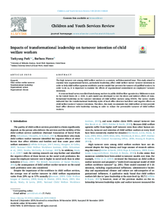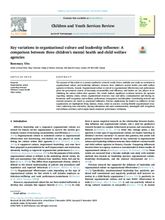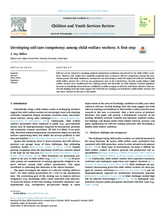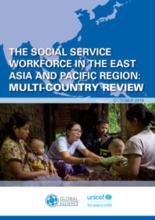Displaying 171 - 180 of 505
In 2019, UNICEF issued its first ever global Guidelines to Strengthen the Social Service Workforce for Child Protection. This two-module course is aligned to the Guidelines and aims to equip the learner with key strategies to strengthen social service workforce.
This study aimed to examine how organizational factors, particularly leadership, affect child welfare worker turnover intentions in order to help child welfare agencies establish a practice model that prevents the turnover of qualified workers.
This Australian longitudinal, qualitative study explored child protection worker perceptions and experiences of resilience to inform understandings of worker resilience, and implications for worker functioning and workforce retention.
This Australian longitudinal, qualitative study explored child protection worker perceptions and experiences of resilience to inform understandings of worker resilience, and implications for worker functioning and workforce retention.
The purpose of this article is to present qualitative research results from a multiple case study on variations in organizational culture and leadership influence between three children’s mental health and child welfare agencies in Ontario, Canada.
A strategy gaining traction to address the disproportionate representation of Aboriginal and Torres Strait Islander children in the statutory child protection system is to recruit more Indigenous practitioners into statutory child protection work. This paper reports on results from a recent doctoral study which explored the experiences of Indigenous child protection practitioners based in Queensland, Australia.
This study employed a retrospective pre/post design to assess the impact of a self-care training for child welfare workers (N=131) in one southeastern state in the United States.
In this blog post for the Global Social Service Workforce Alliance, part of a series celebrating Social Service Workforce Week, Colleen Fitzgerald writes about the need to support the social service workforce and to promote the well-being of caseworkers and social workers.
The purpose of this paper is to investigate how the recommending of contact in special guardianship cases is currently working, by holding focus groups with social workers and special guardians.
The first multi-country review of the social service workforce in the East Asia and Pacific region was prepared by the Global Social Service Workforce Alliance (GSSWA) and the United Nations Children’s Fund (UNICEF) East Asia and the Pacific Regional Office (EAPRO) with the support and contribution of many people throughout the region. This report is one of several regional reports being produced by GSSWA and UNICEF to increase the availability of information on the social service workforce, and provide a baseline from which to consider ongoing workforce strengthening initiatives.




